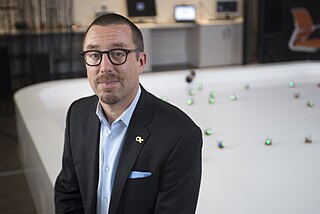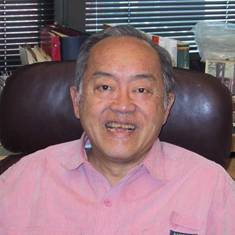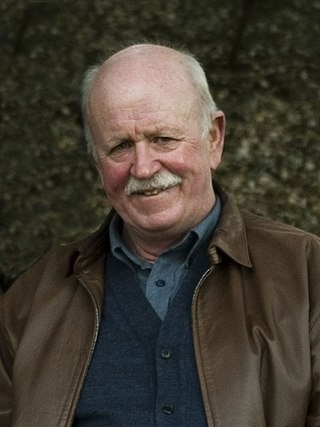
Rudolf Emil Kálmán was a Hungarian-American electrical engineer, mathematician, and inventor. He is most noted for his co-invention and development of the Kalman filter, a mathematical algorithm that is widely used in signal processing, control systems, and guidance, navigation and control. For this work, U.S. President Barack Obama awarded Kálmán the National Medal of Science on October 7, 2009.
Petar V. Kokotovic is professor emeritus in the College of Engineering at the University of California, Santa Barbara, USA. He has made contributions in the areas of adaptive control, singular perturbation techniques, and nonlinear control especially the backstepping stabilization method.

Pramod P. Khargonekar is the Vice Chancellor for Research and Distinguished Professor of Electrical Engineering and Computer Science at the University of California, Irvine. An expert in control systems engineering, Dr. Khargonekar has served in a variety of administrative roles in academia and federal funding agencies. Most recently, he served as Assistant Director for Engineering at the National Science Foundation (2013-2016), and as Deputy Director for Technology at the Advanced Research Projects Agency – Energy. From 2001 through 2009 he was the Dean of the College of Engineering at the University of Florida.

Magnus B. Egerstedt is a Swedish-American roboticist who is the Dean of the Henry Samueli School of Engineering at the University of California, Irvine. He was formerly the Steve C. Chaddick School Chair and Professor at the School of Electrical and Computer Engineering, Georgia Institute of Technology.

Yu-Chi "Larry" Ho is a Chinese-American mathematician, control theorist, and a professor at the School of Engineering and Applied Sciences, Harvard University.
Mustafa Tamer Başar is a control and game theorist who is the Swanlund Endowed Chair and Center for Advanced Study Professor of Electrical and Computer Engineering at the University of Illinois at Urbana-Champaign, USA. He is also the Director of the Center for Advanced Study.
Michael Athans was a Greek-American control theorist and a Professor Emeritus in the Department of Electrical Engineering and Computer Science at the Massachusetts Institute of Technology. He was a Fellow of the IEEE (1973) and a Fellow of the AAAS (1977). He was the recipient of numerous awards for his contributions in the field of control theory. A pioneer in the field of control theory, he helped shape modern control theory and spearheaded the field of multivariable control system design and the field of robust control. Athans was a member of the technical staff at Lincoln Laboratory from 1961 to 1964, and a Department of Electrical Engineering and Computer Science faculty member from 1964 to 1998. Upon retirement, Athans moved to Lisbon, Portugal, where he was an Invited Research Professor in the Institute for Systems and Robotics, Instituto Superior Técnico where he received a honoris causa doctorate from the Universidade Técnica de Lisboa in 2011.

S. Shankar Sastry is the Founding Chancellor of the Plaksha University, Mohali and a former Dean of Engineering at University of California, Berkeley.
Sanjoy Kumar Mitter was a Professor in the Department of Electrical Engineering and Computer Science at MIT who was a noted control theorist.
Richard D. Braatz is the Edwin R. Gilliland Professor at the Massachusetts Institute of Technology known for his research in control theory and its applications to chemical, pharmaceutical, and materials systems.

Dimitri Panteli Bertsekas is an applied mathematician, electrical engineer, and computer scientist, a McAfee Professor at the Department of Electrical Engineering and Computer Science in School of Engineering at the Massachusetts Institute of Technology (MIT), Cambridge, Massachusetts, and also a Fulton Professor of Computational Decision Making at Arizona State University, Tempe.

Mathukumalli VidyasagarFRS is a leading control theorist and a Fellow of Royal Society. He is currently a Distinguished Professor in Electrical Engineering at IIT Hyderabad. Previously he was the Cecil & Ida Green (II) Chair of Systems Biology Science at the University of Texas at Dallas. Prior to that he was an executive vice-president at Tata Consultancy Services (TCS) where he headed the Advanced Technology Center. Earlier, he was the director of Centre for Artificial Intelligence and Robotics (CAIR), a DRDO defence lab in Bangalore. He is the son of eminent mathematician M V Subbarao.
Kenneth A. Loparo is Nord Professor of Engineering and Chair of Department of Electrical Engineering and Computer Science at the Case Western Reserve University, OH, USA, where has been affiliated with since 1979. He was an assistant professor in the Mechanical Engineering Department at Cleveland State University from 1977 to 1979.

Arthur James Krener is an American mathematician. He is a distinguished visiting professor in the department of applied mathematics at the Naval Postgraduate School. He has made contributions in the areas of control theory, nonlinear control, and stochastic processes.
Abraham Jan (Arjan) van der Schaft is emeritus professor of systems and control theory at the Bernoulli Institute of Mathematics Computer Science and Artificial Intelligence, University of Groningen. He is notable for his contributions to network modelling and control of complex physical systems, specifically in the areas of Port-Hamiltonian systems, passivity-based control, nonlinear H∞ control, hybrid systems, and port-thermodynamical systems. He is a Fellow of the IEEE.
Daniel M. Liberzon is the Richard T. Cheng Professor of Electrical and Computer Engineering at the University of Illinois at Urbana–Champaign.
Michael Charles Rotkowitz is an applied mathematician best known for his work in decentralized control theory. He was a professor at the University of Maryland, College Park, where he held appointments in the Department of Electrical and Computer Engineering (ECE) and the Institute for Systems Research (ISR), and was also affiliated with the Applied Mathematics & Statistics, and Scientific Computation Program (AMSC).
Nikolay Vladimirovich Kuznetsov is a specialist in nonlinear dynamics and control theory.
Frank L. Lewis is an American electrical engineer, academic and researcher. He is a professor of electrical engineering, Moncrief-O’Donnell Endowed Chair, and head of Advanced Controls and Sensors Group at The University of Texas at Arlington (UTA). He is a member of UTA Academy of Distinguished Teachers and a charter member of UTA Academy of Distinguished Scholars.
Yuan Wang is a Chinese-American mathematician specializing in control theory and known for her research on input-to-state stability. She is a professor of mathematics at Florida Atlantic University, chair of the university's Department of Mathematical Sciences, and a moderator for the arXiv mathematical preprint repository in the areas of optimization and control (math.OC) and systems and control (cs.SY).








